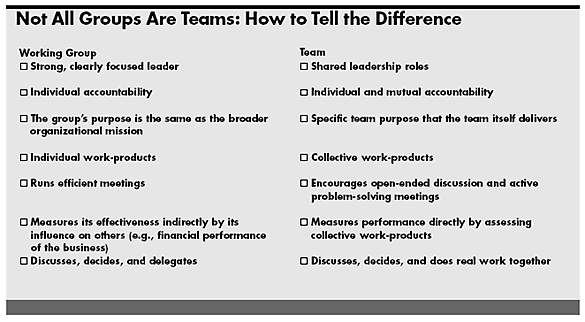 You often hear the word “team” thrown around at work. But did you know your work team may actually be a working group?
You often hear the word “team” thrown around at work. But did you know your work team may actually be a working group?
There’s a fine line between groups and teams, and each has its own purpose to accomplish workplace goals. Here are the differences.
What is a group?
In a group, two or more members work together to complete a task. One leader directs a group to coordinate the task at hand, delegating work among group members.
Members of a group work on their own specializations, with each individual driving toward their own goal. Groups measure success by what an individual completes.
Working groups share information and insights, but create their own independent goals and responsibilities. Collaborative or combined work does not occur within a group.
There are two kinds of groups. A formal group is created by management or leadership to perform a specific task for an organization. An informal group is formed naturally around a common interest, identity, or social goal.
Think about it this way: you may have a formal group of managers whose ultimate goal is the success of your company, but they manage their teams on an individual basis and determine their own objectives and key results. Or maybe your business has a women's network that informally comes together to share best practices in salary negotiation and career development. While these groups may congregate often, each member handles their own independent work.
What is a team?
A team, like a group, has a shared goal but focuses more on a collective purpose. Teams work together to build one product through both individual and mutual contributions. This interdependent work lends to one combined end result.
A team’s common goal gives each member a shared responsibility toward it. Team-wide efforts are directly responsible for the outcome. Team members elevate each other’s strengths and fill in the gaps where teammates’ skills are lacking. Because of this, teams are able to do more than the members would on their own.
Having one specific goal in mind means that a team cannot function on individual contributions. Team members need a collaborative environment to combine their specialized skills and achieve their end goal.
Groups vs. Teams
 There's a fine line between groups and teams.
There's a fine line between groups and teams.
Chart via Harvard Business Review.
So how do you know if your project or your business needs a group or a team? Establishing a team vs group ultimately comes down to your end goal.
You’ll need a work group when:
- You want to get things done quickly and efficiently
- Your project has no definite endpoint
- You have individual goals to accomplish
- You have only one leader
- You want to delegate problem resolution to individuals
You’ll need a work team when:
- You have a big project and a long amount of time to work
- Your project has a set timeline
- You have one overall goal to accomplish
- You have multiple leaders
- You want problems to be solved collectively
How to tell if your group is a team
A key indicator that your group is actually a team is a mutual commitment to the group’s purpose or end goal, rather than to the tasks each individual must perform. Mutual accountability and a standardized workflow are also indicative of a team.
So what’s the real difference between a group and a team? Teams are interdependent, working together to emphasize each other’s strengths and complete a common goal. Groups utilize individual strengths to get work done and members focus on their own goals.





